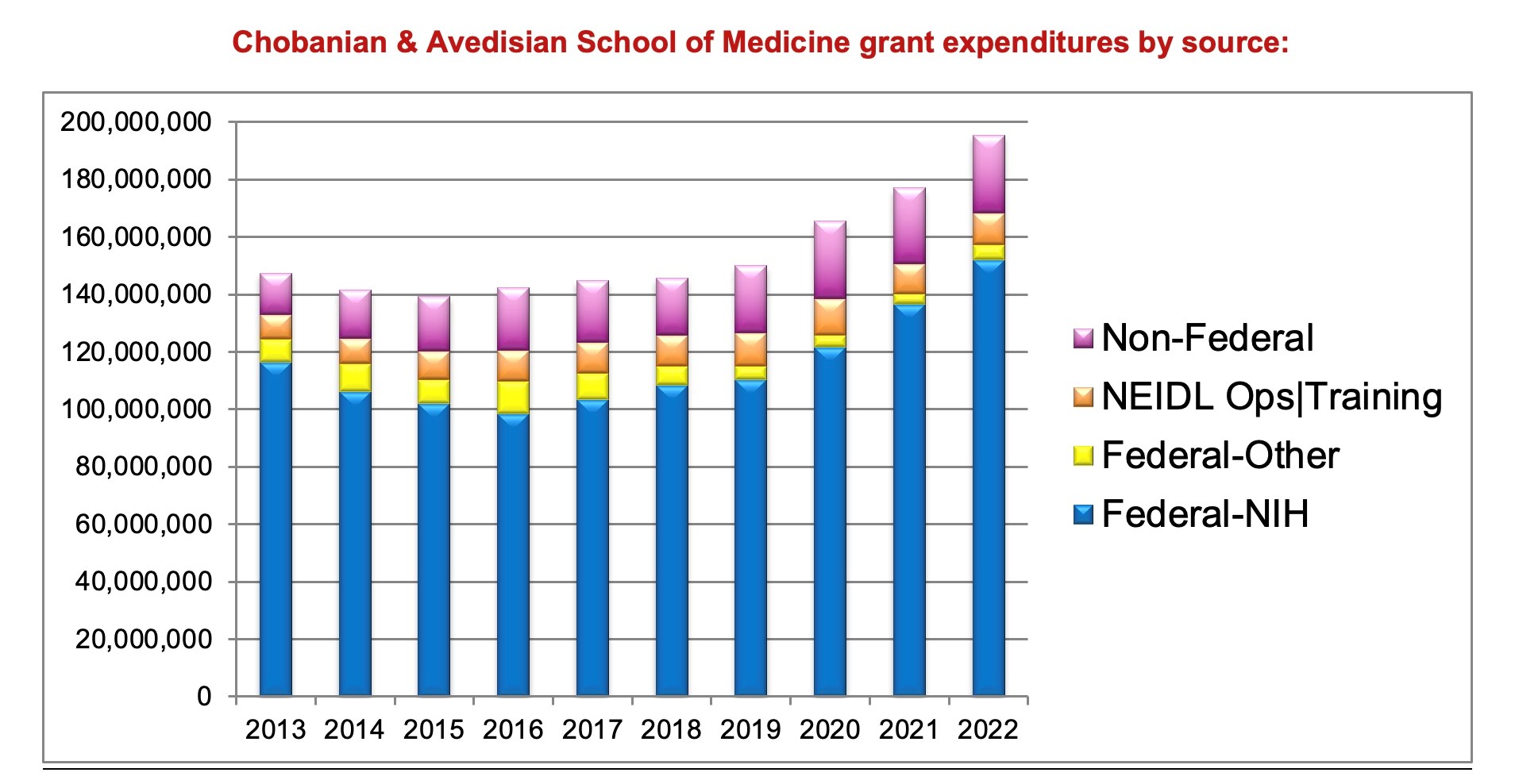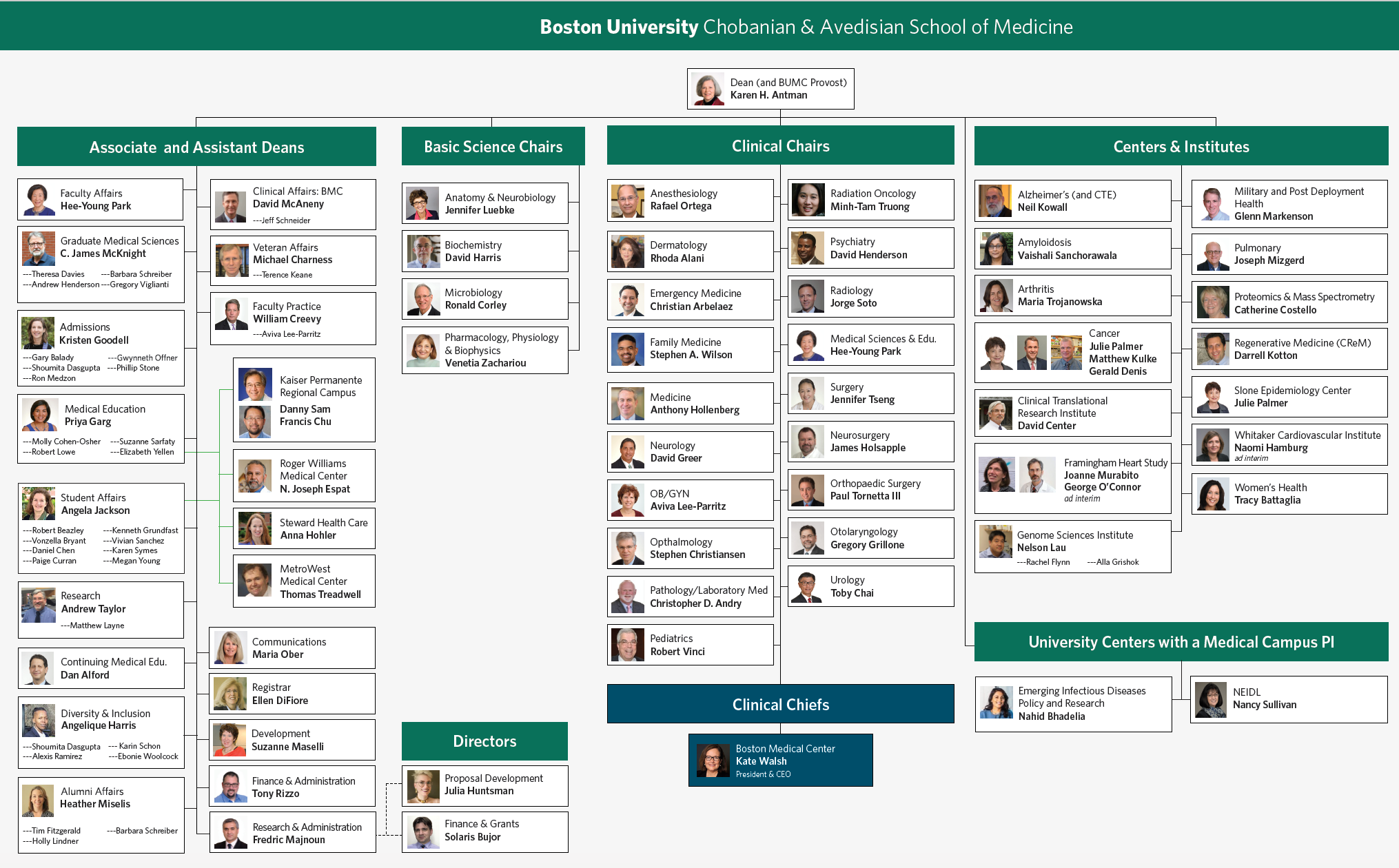Chair Virology, Immunology & Microbiology
Access the PDF
| Reporting | Basic Science Chairs report to the Dean of the School of Medicine |
| Website: Boston University | https://www.bu.edu/about/ |
| Website: School | https://www.bumc.bu.edu/camed/ |
| Website: Department | https://www.bumc.bu.edu/virol-immunol-microbio/ |
Position Overview and Opportunity
The Department of Virology, Immunology & Microbiology (VIM) at the BU Chobanian & Avedisian School of Medicine seeks an exceptional academic leader to serve as Chair. The school is affiliated with the Northeast’s largest safety net hospital, and recently received a $100M endowment to support medical and research excellence within the school.
Our diverse research strengths, include the nationally and internationally recognized National Emerging Infectious Diseases Laboratories (NEIDL), Pulmonary Center, Center for Regenerative Medicine, Framingham Heart Study, Chronic Traumatic Encephalopathy Center and Alzheimer’s Disease Center.
VIM is a dynamic department ranked #15 in NIH funding by the Blue Ridge Institute for Medical Research in 2022. This is a unique opportunity to lead a strong basic science department and direct its expansion.
The chair must be a passionate advocate for their department’s students, staff and faculty. They will be a major institutional leader, working with the Dean’s Office in leading the academic enterprise for the school. The successful chair will have the opportunity to build a nationally and internationally renowned department on a foundation of research, training, and educational excellence, serving as an advocate within the university for all of its missions.
The successful chair must bring vision to drafting the department’s future, coupled with a leadership style that inspires others. Above all, the chair will be a consensus builder and agent for change in an era where the research enterprise is undergoing innovation and transformation nationwide.
Core Responsibilities
- Recruit, hire, and retain outstanding and diverse faculty
- Support and promote departmental faculty at the university, national, and international level
- Lead the Department research and education programs
- Foster a collegial environment within the department
- Promote collaborations
- Define and implement strategies that expand and strengthen the department’s research portfolio
- Manage the departmental budget and ensure compliance with grant and institutional guidelines
Critical Success Factors
Department leadership will be evaluated annually based on:
- Departmental growth in research funding and accomplishments when compared with similar departments nationally and with the concurrent change in the NIH budget.
- Quality of the department’s educational programs for postdocs as well as graduate, medical, and dental students.
- Fiscal responsibility (balanced budget)
- Appropriate use of research space resources (F&A/square foot)
- Faculty development within the department
- Interdepartmental collaborations
- Diversity of students and faculty; commitment to equity for all
- Department citizenship and service on the school committees
Qualifications
Education
The successful candidate will have earned a PhD, MD, MD/PhD or equivalent and at least 13 years of experience post terminal degree.
Experience
- Demonstrated track record of leadership and management gained within a medical center, research intensive university, or microbiology/immunology institute.
- Research background in virology, immunology and/or microbiology.
- Strong organizational, financial, and budgetary skills that enable long-term planning towards strategic and tactical departmental goals.
- Success in mentoring and developing outstanding talent towards research and academic success.
- A strong record of research accomplishments, productivity, and peer-reviewed extramural funding.
Personal Characteristics
- A clear strategic vision for departmental development.
- Demonstrated political acumen to address the needs of diverse stakeholders.
- A collaborative approach and willingness to take an institutional view of goals.
- Excellent communication skills across diverse audiences.
Equal Opportunity
Boston University is an equal opportunity employer, and all qualified applicants will receive consideration for employment without regard to race, color, religion, sex, sexual orientation, gender identity, national origin, disability status, protected veteran status, or any other characteristic protected by law.
Compensation and Equal Opportunity
Compensation arrangements are competitive and commensurate with both experience and achievement. Boston University is an equal opportunity employer and all qualified applicants will receive consideration for employment without regard to race, color, religion, sex, sexual orientation, gender identity, national origin, disability status, protected veteran status, or any other characteristic protected by law.
Procedure for Candidacy
The search committee will begin reviewing candidates immediately and will continue until the position is filled. Applicants should send electronically to CAMedDean@bu.edu:
- a letter of interest that highlights the applicant’s vision for the department and relevant leadership experience,
- an NIH biosketch with research contributions and
- a full curriculum vitae.
Department of Virology, Immunology & Microbiology
https://www.bumc.bu.edu/virol-immunol-microbio/
The Department of Virology, Immunology & Microbiology (VIM) includes a highly interactive group of faculty, staff and trainees whose research and education focuses on understanding human pathogens, the diseases they cause, and the development of protective or aberrant immune responses. The department is located in newly renovated contiguous space on the medical campus and has state of the art BSL-2 and BSL-2+ laboratories.
Our diverse faculty expertise converges into the themes of viral molecular biology, host-pathogen interactions, and immunology. Our research benefits from state-of-the-art facilities and a strong network of collaborative links with faculty in other disciplines at BU, as well as national and international collaborations. In addition, the National Emerging Infectious Diseases Laboratories (NEIDL) at Boston University puts the department and its faculty in the distinctive position of being able to study highly pathogenic organisms. https://www.bumc.bu.edu/virol-immunol-microbio/
Faculty: https://www.bumc.bu.edu/virol-immunol-microbio/people/faculty/
Research
The department boasts active and well-funded research groups. Our position at #15 on the Blue Ridge Institute for Medical Research ranking of funding in 2022 and total extramural research funding in excess of $30M demonstrates the success of our faculty. Some faculty within the department direct and participate in external groups including the Providence/Boston Center for AIDS Research (CFAR) and the Massachusetts Consortium on Pathogen Readiness (MassCPR). The faculty also maintain numerous industry partnerships and several occupy space within the NEIDL. The faculty excel in the areas of virology and viral immunology with specific foci on HIV and RNA virology. Within these areas complementary approaches include animal model development for basic and translational research, high-throughput screening for countermeasure development, big-data analysis, multi-parameter flow cytometry, molecular virology, enzymology, and detailed dissection of virus-host interactions. An incoming chair will be anticipated to promote and complement these areas of research through faculty recruits. The school has recently purchased a Glacios 2 Cryo-EM along with advanced computer technology capable of high-resolution determination of native and variant virus structure.
Education/Training
The full-time graduate program in Virology, Immunology & Microbiology provides training towards PhD and MD-PhD degrees. Our goal is to provide rigorous training for our exceptional students to prepare them for a career in research science. Entry into the PhD program is via the umbrella PhD graduate program, Program in Biomedical Sciences (PiBS), offered by Graduate Medical Sciences in the Chobanian & Avedisian School of Medicine. MD/PhD students enter through the MD/PhD Training Program. Students are supported by individual training fellowships, and a VIM-sponsored T32 training grant that supports research in Immunology now in its 33rd year, and faculty research grants.
National Emerging Infectious Diseases Laboratories (NEIDL)
The department enjoys a close and collaborative working relationship with the National Emerging Infectious Diseases Laboratories (NEIDL). Located next-door to the contiguous VIM space, the NEIDL is one of two national secure facilities that conducts research to investigate and develop countermeasures for high consequence emerging and re-emerging pathogens and the diseases they cause. The facility contains biosafety level 2 (BSL-2), BSL-3, and BSL-4 laboratories that allow scientists to safely study pathogens in a secure environment.
Boston University’s Chobanian & Avedisian School of Medicine
https://www.bumc.bu.edu/camed/
Established in 1848, the BU Chobanian & Avedisian School of Medicine, originally named the New England Female Medical College, was the first institution in the US to formally educate women physicians. It became the BU School of Medicine when it became co-educational in 1873. The school graduated the first black American woman physician in the United States, Dr. Rebecca Lee Crumpler in 1864, and the first Native American physician, Dr. Charles Eastman in 1890. The school did not exclude outstanding applicants because of sex or race and has not needed to change the names of any buildings.
Today, the school ranks No. 32 in Best Medical Schools (Research) in the 2023 edition of U.S. News & World Report. The school continues to make critical investments to strengthen its cutting-edge research and capabilities, particularly interdisciplinary approaches to discovery and innovation. A critical success factor in expanding these changes is the recruitment of a new Chair for the Department of Virology, Immunology & Microbiology.
The school, as stated in its mission statement, is dedicated to the educational, intellectual, professional, and personal development of a diverse group of exceptional students, trainees, and faculty who are deeply committed to the study and practice of medicine, to biomedical research, and to public health.
Its values include inclusive excellence, integrity, service, social justice, collegiality, equality of opportunity, and interdisciplinary collaboration.
The school supports all aspects of biomedical research, from basic exploration to outcomes research, with particular emphasis on interdisciplinary translational collaborations between bench and bedside.
Research cores and services: https://www.bumc.bu.edu/camed/research/cores/
We are committed to fostering the development of the next generation of exceptional biomedical scientists currently enrolled in Masters and PhD programs, as well as medical and dental students.



